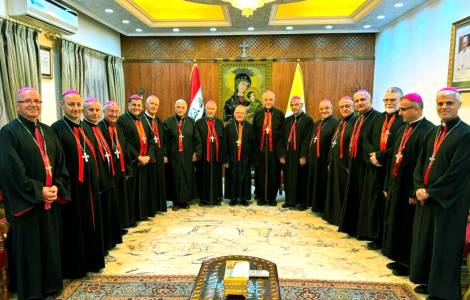Two peoples, two States: the Chaldean bishops, gathered in Baghdad for the annual Synod of the Chaldean Church, observe with concern the numerous conflicts that are tearing apart the Middle East, focusing in particular on the situation in the Holy Land.
According to a press release published at the end of the assembly, which was held from July 15 to 19 at the patriarchal seat of Al-Mansour, the prelates sent a letter to the Pontiff before beginning the work, “requesting his fatherly blessing and his prayers that the discussions of the Synod may be fruitful for the well-being of the Church and the country.”
Different themes were discussed. Each meeting, they stressed, took place “in a climate of familiarity, democracy and fraternity, which allowed them to highlight certain aspects” of the life of Christian communities living in the Middle East, starting from the war in the Holy Land and its consequences for the entire region.
The bishops of the Chaldean Synod chaired by Patriarch Louis Raphaël Sako, in addition to expressing “their deep concern”, “condemn violence in all its forms”. Hence the invitation to the international community to make serious efforts “to protect and affirm peace at all times”, in order to “immediately end the war”.
On possible solutions, the Chaldean bishops espouse the line that Pope Francis has also expressed on several occasions, namely that of two peoples in two “neighboring States living in peace, security, stability and mutual trust”.
The gaze of the Chaldean bishops then focused on the Christian people living in the region, a people who “have suffered greatly over the last two decades due to deprivation of their rights, marginalization, social exclusion and the seizure of goods and properties”. Abuses “which have pushed many Christians to emigrate in search of a better environment”.
The bishops therefore call on “our dear government to treat the Christian community equitably, giving it confidence and strengthening cooperation, at the national level, taking advantage of each person’s skills to develop this country.” The synod also calls on the government to “fully respect their rights as citizens, with equal representation and employment.”
It is therefore also a reflection on the future of Christians in the Middle East. In this regard, the Chaldean Synod renews “Patriarch Sako’s call for unity and solidarity. Our faith and our land are the pillars that unite us.” Then expressing “our fraternal sympathy to the bishops of neighboring countries”, the Chaldean Synod Fathers are convinced “that the Church needs a new vision of the future as much as courageous practical measures to stabilize Christians in their land, in preserving their identity and improving their role and presence in society.”
“Unity, they emphasize, is our strength and our salvation. Despite the wounds, we continue to love our countries and our citizens, and we would like to collaborate with them to spread a culture of coexistence, respecting the differences of others and consolidating the hope of a just and civilized society.”
Finally, the Synod having been held immediately after the return of His Beatitude to the official headquarters of the Patriarchate in Baghdad, the Chaldean bishops appreciated and expressed their gratitude for the “legal and courageous” initiative of the Prime Minister, Muhammad Shiaa Al-Sudani , who published a decree confirming the designation of Patriarch Sako as head of the Chaldean Church and entrusting the management of its property to the Cardinal.
The Patriarch and the bishops, according to the final communiqué, express “the hope that the government, together with the parties, will take concrete measures to build peace and stability, by applying the laws, restoring national unity, strengthening the concept of citizenship and providing adequate public services so as to ensure a dignified life for all citizens”, which also explains the call to give “priority to the interests of the Iraqi people.
By: Fides






